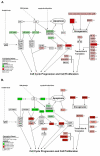Gene expression profiling revealed novel mechanism of action of Taxotere and Furtulon in prostate cancer cells
- PMID: 15656911
- PMCID: PMC548501
- DOI: 10.1186/1471-2407-5-7
Gene expression profiling revealed novel mechanism of action of Taxotere and Furtulon in prostate cancer cells
Abstract
Background: Both Taxotere and Capecitabine have shown anti-cancer activity against various cancers including prostate cancer. In combination, Taxotere plus Capecitabine has demonstrated higher anti-cancer activity in advanced breast cancers. However, the molecular mechanisms of action of Taxotere and Capecitabine have not been fully elucidated in prostate cancer.
Methods: The total RNA from PC3 and LNCaP prostate cells untreated and treated with 2 nM Taxotere, 110 microM Furtulon (active metabolite of Capecitabine), or 1 nM Taxotere plus 50 microM Furtulon for 6, 36, and 72 hours, was subjected to Affymetrix Human Genome U133A Array analysis. Real-time PCR and Western Blot analysis were conducted to confirm microarray data.
Results: Taxotere and Furtulon down-regulated some genes critical for cell proliferation, cell cycle progression, transcription factor, cell signaling, and oncogenesis, and up-regulated some genes related to the induction of apoptosis, cell cycle arrest, and differentiation in both cell lines. Taxotere and Furtulon also up-regulated some genes responsible for chemotherapeutic resistance, suggesting the induction of cancer cell resistance to these agents.
Conclusions: Taxotere and Furtulon caused the alternation of a large number of genes, many of which may contribute to the molecular mechanisms by which Taxotere and Furtulon inhibit the growth of prostate cancer cells. This information could be utilized for further mechanistic research and for devising optimized therapeutic strategies against prostate cancer.
Figures




References
-
- American Cancer Society . Cancer Facts & Figures 2004 Inc. American Cancer Society, Inc; 2004. Cancer Facts & Figures 2004; pp. 4–6.
-
- Fulton B, Spencer CM. Docetaxel. A review of its pharmacodynamic and pharmacokinetic properties and therapeutic efficacy in the management of metastatic breast cancer. Drugs. 1996;51:1075–1092. - PubMed
Publication types
MeSH terms
Substances
LinkOut - more resources
Full Text Sources
Medical

